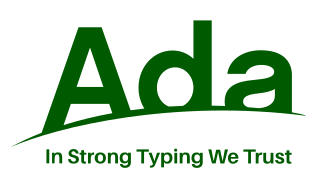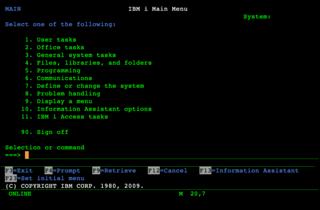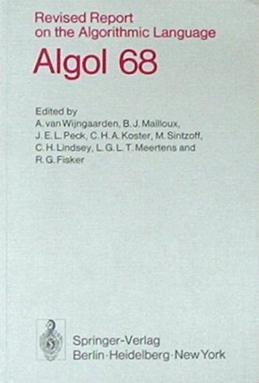Related Research Articles

Ada is a structured, statically typed, imperative, and object-oriented high-level programming language, inspired by Pascal and other languages. It has built-in language support for design by contract (DbC), extremely strong typing, explicit concurrency, tasks, synchronous message passing, protected objects, and non-determinism. Ada improves code safety and maintainability by using the compiler to find errors in favor of runtime errors. Ada is an international technical standard, jointly defined by the International Organization for Standardization (ISO), and the International Electrotechnical Commission (IEC). As of May 2023, the standard, called Ada 2022 informally, is ISO/IEC 8652:2023.

In computer programming, assembly language, often referred to simply as assembly and commonly abbreviated as ASM or asm, is any low-level programming language with a very strong correspondence between the instructions in the language and the architecture's machine code instructions. Assembly language usually has one statement per machine instruction (1:1), but constants, comments, assembler directives, symbolic labels of, e.g., memory locations, registers, and macros are generally also supported.

Oberon is a general-purpose programming language first published in 1987 by Niklaus Wirth and the latest member of the Wirthian family of ALGOL-like languages. Oberon was the result of a concentrated effort to increase the power of Modula-2, the direct successor of Pascal, and simultaneously to reduce its complexity. Its principal new feature is the concept of data type extension of record types. It permits constructing new data types on the basis of existing ones and to relate them, deviating from the dogma of strict static typing of data. Type extension is Wirth's way of inheritance reflecting the viewpoint of the parent site. Oberon was developed as part of the implementation of an operating system, also named Oberon at ETH Zurich in Switzerland. The name was inspired both by the Voyager space probe's pictures of the moon of the planet Uranus, named Oberon, and because Oberon is famous as the king of the elves.
PL/I is a procedural, imperative computer programming language initially developed by IBM. It is designed for scientific, engineering, business and system programming. It has been in continuous use by academic, commercial and industrial organizations since it was introduced in the 1960s.
Pascal is an imperative and procedural programming language, designed by Niklaus Wirth as a small, efficient language intended to encourage good programming practices using structured programming and data structuring. It is named after French mathematician, philosopher and physicist Blaise Pascal.
In computer programming, a p-code machine is a virtual machine designed to execute p-code. This term is applied both generically to all such machines, and to specific implementations, the most famous being the p-Machine of the Pascal-P system, particularly the UCSD Pascal implementation, among whose developers, the p in p-code was construed to mean pseudo more often than portable, thus pseudo-code meaning instructions for a pseudo-machine.

UCSD Pascal is a Pascal programming language system that runs on the UCSD p-System, a portable, highly machine-independent operating system. UCSD Pascal was first released in 1977. It was developed at the University of California, San Diego (UCSD).
Turbo Pascal is a software development system that includes a compiler and an integrated development environment (IDE) for the programming language Pascal running on the operating systems CP/M, CP/M-86, and DOS. It was originally developed by Anders Hejlsberg at Borland, and was notable for its very fast compiling. Turbo Pascal, and the later but similar Turbo C, made Borland a leader in PC-based development tools.

IBM i is an operating system developed by IBM for IBM Power Systems. It was originally released in 1988 as OS/400, as the sole operating system of the IBM AS/400 line of systems. It was renamed to i5/OS in 2004, before being renamed a second time to IBM i in 2008. It is an evolution of the System/38 CPF operating system, with compatibility layers for System/36 SSP and AIX applications. It inherits a number of distinctive features from the System/38 platform, including the Machine Interface which provides hardware independence, the implementation of object-based addressing on top of a single-level store, and the tight integration of a relational database into the operating system.

Delphi is a general-purpose programming language and a software product that uses the Delphi dialect of the Object Pascal programming language and provides an integrated development environment (IDE) for rapid application development of desktop, mobile, web, and console software, currently developed and maintained by Embarcadero Technologies.
Object Pascal is an extension to the programming language Pascal that provides object-oriented programming (OOP) features such as classes and methods.

ALGOL 68 is an imperative programming language that was conceived as a successor to the ALGOL 60 programming language, designed with the goal of a much wider scope of application and more rigorously defined syntax and semantics.

Jean David Ichbiah was a French computer scientist and the initial chief designer (1977–1983) of Ada, a general-purpose, strongly typed programming language with certified validated compilers.
In computer programming, a runtime system or runtime environment is a sub-system that exists both in the computer where a program is created, as well as in the computers where the program is intended to be run. The name comes from the compile time and runtime division from compiled languages, which similarly distinguishes the computer processes involved in the creation of a program (compilation) and its execution in the target machine.
The following outline is provided as an overview of and topical guide to computer programming:
New Implementation of LISP (NIL) is a programming language, a dialect of the language Lisp, developed at the Massachusetts Institute of Technology (MIT) during the 1970s, and intended to be the successor to the language Maclisp. It is a 32-bit implementation, and was in part a response to Digital Equipment Corporation's (DEC) VAX computer. The project was headed by Jon L White, with a stated goal of maintaining compatibility with MacLisp while fixing many of its problems.
The ACS-1 and ACS-360 are two related supercomputers designed by IBM as part of the Advanced Computing Systems project from 1961 to 1969. Although the designs were never finished and no models ever went into production, the project spawned a number of organizational techniques and architectural innovations that have since become incorporated into nearly all high-performance computers in existence today. Many of the ideas resulting from the project directly influenced the development of the IBM RS/6000 and, more recently, have contributed to the Explicitly Parallel Instruction Computing (EPIC) computing paradigm used by Intel and HP in the Itanium processors.
Plus is a "Pascal-like" system implementation language from the University of British Columbia (UBC), Canada, based on the SUE system language developed at the University of Toronto, c. 1971.
Zonnon is a general purpose programming language in the line or family of the preceding languages Pascal, Modula, and Oberon. Jürg Gutknecht is the author.
In computer programming, self-hosting is the use of a program as part of the toolchain or operating system that produces new versions of that same program—for example, a compiler that can compile its own source code. Self-hosting software is commonplace on personal computers and larger systems. Other programs that are typically self-hosting include kernels, assemblers, command-line interpreters and revision control software.
References
- ↑ Mark Smotherman. "S-1 Supercomputer (1975-1988)". Archived from the original on 2014-01-11.
- ↑ Frankston, Charles (1984). "6 Implementation". The Amber Operating System (Thesis). MIT . Retrieved 2014-02-01.
- ↑ Mark Smotherman (June 28, 2005). "S-1 Supercomputer Alumni". Archived from the original on 2014-01-03.
- ↑ Jeff Broughton. "THE S-l PROJECT: Advancing the Digital Computing Technology Base for National Security Applications" . Retrieved 2014-02-01. Chapter: S-l Software Development: Programming Languages Supported